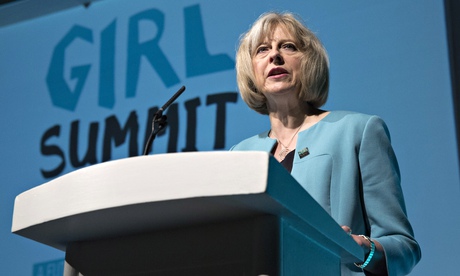
The government is to set up a unit to tackle female genital mutilation as part of a wide-ranging package of reforms to stop the practice in the UK.
Speaking at the Girl Summit – a major international conference in London designed to highlight the issues of FGM and child marriage – the home secretary, Theresa May, said the cross-party unit would help protect thousands of girls across the country.
The unit, which could operate in a similar way to the government's forced marriage unit, has been a key demand of campaigners against FGM. "These measures will ensure that we can maintain the momentum on stamping out these harmful practices," May said.
The home secretary said the government would also strengthen laws around FGM, and would hold parents responsible if their child was a victim of the practice. May also announced a consultation into making it mandatory for professionals to report FGM and said victims going through court cases would be given lifelong anonymity.
A push to improve police responses to FGM will see forces inspected on their response to honour-based violence, with a focus on FGM and forced marriage. The college of policing has also begun a consultation on new guidelines, which will urge officers to dismiss fears of being labelled racist when dealing with FGM. FGM has been illegal in the UK for three decades, but the first prosecution was only made in March and is currently going through the courts.
May said that as part of a £1.4m FGM prevention programme, charities will receive funding to create community "champions" with the "cultural knowledge and the connections necessary to challenge beliefs and behaviours".
"We are making progress. Today we are taking one more step on the road towards giving women a voice and eradicating these harmful practices," she said.
Meanwhile, more than 600 people attended an event at the Walworth academy in south London as part of the Girl Summit. In a video message, the general secretary of the UN, Ban Ki-moon, said he had been inspired by young campaigners on the issue. He singled out for praise Fahma Mohamed, the face of the Guardian's campaign to get more information FGM into schools. "I commend global leaders and brave activists confronting these problems especially the courageous from young women in affected communities," he said. "They deserve our full support. Like Fahma Mohamed, who inspired me so much when we met in March with the Guardian's campaign. I pledged to her, and I repeat today, that I will continue to raise my voice about the urgency of ending these harmful practices."

